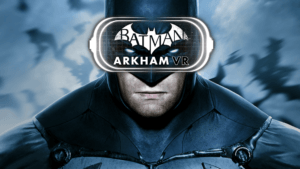Warner Bros: Can a Traditional Hollywood Studio Become a Big Player in VR Content?

As new and better VR technologies are developed, Hollywood studios are scrambling to create high quality content for VR platforms. Over the past couple of years, Warner Bros. in particular has experimented with creating VR content for a number of its franchises. Despite the slower than expected sales of VR headsets, Warner Bros.’s Chief Digital Officer Thomas Gewecke recently predicted, “VR and AR represent an enormous opportunity…We’ve learned that we are in the really early days.” The studio shows no signs of slowing down its investments in VR-related content.
Creating Content for VR Platforms
So far, Warner Bros. has primarily chosen to strike partnerships with major VR platforms to distribute its content. Warner Bros.’s Rocksteady Studios released Batman: Arkham VR earlier this year, allowing fans to don the famous black cape, solving crimes and apprehending villains in a virtual Gotham-like environment. The game was originally released exclusively for PlayStation VR’s launch, but Warner Bros. recently made the game available on both HTC VIVE and Oculus Rift and released a PC version as well.
The critically acclaimed Batman Arkham VR is Warner Bros.’s most substantial VR game to date, but the studio has ambitious goals of creating more VR content to coincide with the upcoming releases of its tentpole films. Warner Bros. signed a deal with IMAX last month to co-finance and produce three interactive VR experiences based on the highly anticipated Justice League and Aquaman films. IMAX has built a flagship IMAX VR center in Los Angeles that allows viewers to pay for different VR experiences that are housed in its pods (akin to theaters). If the Los Angeles VR center proves successful, the company plans to aggressively expand its IMAX VR center footprint across the U.S. and China. Warner Bros.’s VR experiences will likely be featured prominently in IMAX’s new VR centers.
In addition, Warner Bros. has also entered into an exclusive agreement with HTC Vive for the distribution of VR experiences related to its upcoming Ready Player One film directed by Steven Spielberg. The potential is huge, as the novel the film is based on has been described by those in the VR industry as a “seminal piece of writing about virtual worlds.” HTC has agreed to distribute the new VR content through its Viveport platform (serving both mobile and high-end PC based VR systems) and its Viveport Arcade platform for location-based entertainment.
Investing in VR Technologies and Concepts
Along with creating content for VR, Warner Bros. has also been proactive about investing in VR-related projects. The studio invested in Dreamscape Immersive, a new startup in Los Angeles that plans to open location-based VR multiplexes. The ambitious project envisions allowing guests to enter multiplex facilities and move freely through spaces, interacting with each other and real and virtual objects along the way.
Warner Bros. has also made investments in VR technologies. For one, the studio participated in Magic Leap’s $793.5 million Series C round of funding in February 2016 (see below for a depiction of Magic Leap’s technology). What’s more interesting, however, is that Warner Bros. also patented the design for a fully immersive movie theater experience for VR and AR earlier this month. The patent contains some preliminary designs that work with VR and AR headsets (such as Microsoft’s HoloLens mixed reality headset) in movie theaters and homes.
Experimenting with Business Models
It is clear that Warner Bros. creates value for consumers by developing engaging VR content and technologies, but its monetization plans are murkier. On the content side, Warner Bros. has experimented with a couple of different pricing options for its games. The Batman Arkham VR game retailed at $20 across all platforms, whereas Suicide Squad: Special Ops VR, the VR game that accompanied the blockbuster movie, was free to download on the Oculus store. As Warner Bros. creates more VR titles for upcoming releases of new films, TV shows, and games, it should actively experiment with pricing and revenue models (i.e. advertising-supported, in-game upgrades, in-game content unlocks) to optimize for what works best. My initial hypothesis is that the optimal pricing model will be determined by how widespread VR headset adoption is—higher adoption would better support the freemium pricing model.
On the distribution side, Warner Bros. also needs to make decisions along a couple of different dimensions:
- Exclusivity: Does Warner Bros. want to give exclusive distribution rights to partners? Preliminary evidence suggests that Batman Arkham VR‘s exclusivity deal with PlayStation VR did not work out, leading to the decision to release the game on other platforms. In the future, Warner Bros. should evaluate exclusivity terms carefully and aim to negotiate very favorable terms (such as revenue splits), especially for high-profile VR games. On balance, the best strategy for Warner Bros. is probably to distribute on non-exclusive terms to all VR distribution platforms, as this avoids limiting the pool of potential customers.
- Distribution channels: Should Warner Bros. create their own distribution channels or rely on the existing players (HTC Vive, Oculus Rift)? In digital media, Warner Bros. is planning on developing its own OTT services (such as the new DC Comics OTT that was announced this week). The studio has the option of pursuing a similar strategy for VR in the future. The company can consider launching its own VR distribution channel with exclusive, high-quality themed content. However, in order for this value proposition to make sense, Warner Bros. must develop highly sought after VR content and be able to build its own distribution channel relatively inexpensively.
Beyond these decisions, Warner Bros. must decide whether or not to increase its investments in VR technology through participation in more advanced rounds of funding or acquisitions. It is currently more of a passive investor in Dreamscape and Magic Leap, but it doesn’t have to be. For instance, if Warner Bros. is serious about developing its patent design and technology, it will likely need to partner with a hardware manufacturer or exhibitor. Acquiring a larger share of Magic Leap (hardware manufacturer) or Dreamscape (exhibitor) would be one way to accomplish this.
As the VR space becomes more developed, Hollywood studios will play a crucial role in the creation and distribution of content. Warner Bros. should continue to be forward-thinking in VR by experimenting with content creation and making investments in VR technology.





